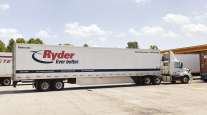Staff Reporter
Call Center Staffs Work From Home Due to Coronavirus

[Ensure you have all the info you need in these unprecedented times. Subscribe now.]
Call centers industrywide have made a swift shift to working from home in response to the coronavirus.
Ryder System Inc. is one company that has made the transition, and it helped to have a plan in place.
“We set up a routine to work from home out of a necessity long before COVID-19,” Bill Dawson, vice president of maintenance and engineering at Ryder, told Transport Topics. “Fortunately, that put us in a good position to respond very quickly when we had to pull people out of our facility.”

An Averitt Express call center worker. (Averitt Express via YouTube)
Dawson said that before the pandemic Ryder was running out of space at its facility in Roswell, Ga. So the company allowed about 10% of its personnel to work from home as a reward for good work. Ryder Assist Now and other efforts to connect to customers more frequently also were factors driving that capability.
“It’s only been a couple months,” Dawson said. “Who knows where we will be after a year or longer? But for now, we were able to move all 300 people to a work-from-home environment within a couple of days’ time and have had almost zero turnover in that period.”
Dawson said the switch hasn’t hurt staff performance during the pandemic, and he said it even has improved somewhat.
“Now, that’s not due to work from home,” Dawson said. “That’s because, generally, you’re speaking to businesses a little slower, and there are other things that are making the facilitation of performance easier. But overall, I am really proud with how the team was able to quickly transition.”
Ryder System is the parent of Ryder Supply Chain solutions, which ranks No. 11 on the Transport Topics Top 100 list of the largest for-hire carriers in North America.
Averitt Express, No. 32 on the for-hire TT100, also had established a work-from-home plan before the pandemic. The transportation and supply chain management company allowed some of the employees at its national call center to work remotely. Now, the entire call center staff is doing just that.
“In terms of our corporate offices, we have a lot of people working from home,” Amos Rogan, Averitt’s less-than-truckload operations leader, told TT. “Luckily, we had already started to do that within our customer service group for a couple of years now by allowing those who have the capability to work from home.”
Rogan added that working from home previously helped save space at the corporate office. It also gave those with issues such as long commutes an easier option.
“They can still be monitored and managed through some software that we have,” Rogan said. “We have been able to expand on that to allow people to work from home to keep them safe. We’re lucky in that we started that ahead of time.”
Averitt Express has about 900 associates working at its corporate campus, including the national call center. Now, about two-thirds of those personnel are working from home.
“We were just able to take that same technology, and same technology requirements, and those that would normally be working in a corporate environment, allow them to work from home as well,” Rogan said. “At this point, we don’t know whether it’s permanent, but we do know right now that it is indefinite.”

Hurst
Roadrunner Transportation Systems Inc., No. 17 on the for-hire TT100, also has transitioned its call center to remote work. Roadrunner Freight President Frank Hurst had doubts at first about call center staff and dispatchers working from home, but that has changed since the leadership team’s discussions in early March.
“So, we really worked on what can we do with those two groups,” Hurst told TT. “Both of those groups, to the credit of their management team and leaders, they went home, and I will tell you they are more productive today than they ever have been.
“Not only have our costs declined, our service within the call center, our abandon rates, our average hold time are actually at record lows. They have done a great job there.”
Hurst added that he initially was hesitant because both departments were centralized in the past few years. They previously had customer service groups embedded throughout various service centers. Now, 100 employees are working at the Akron, Ohio-based call center.

Kluesner
UniGroup has had all of its estimated 700 employees who normally would be working at its headquarters operating from home since March 17. About 50 work in the call center.
“We have a headquarters, we have a call center embedded in the headquarters,” Scott Kluesner, UniGroup’s executive vice president of operations, told TT. “Now, because you can operate very successfully remotely, there are certain functional areas within the business operation that I’m not sure will have to come back, if ever. The call center, for example.
“I just think it’s been an eye-opener for us. We stepped back and asked, ‘What is absolutely mandatory?’ ”
Want more news? Listen to today's daily briefing:




